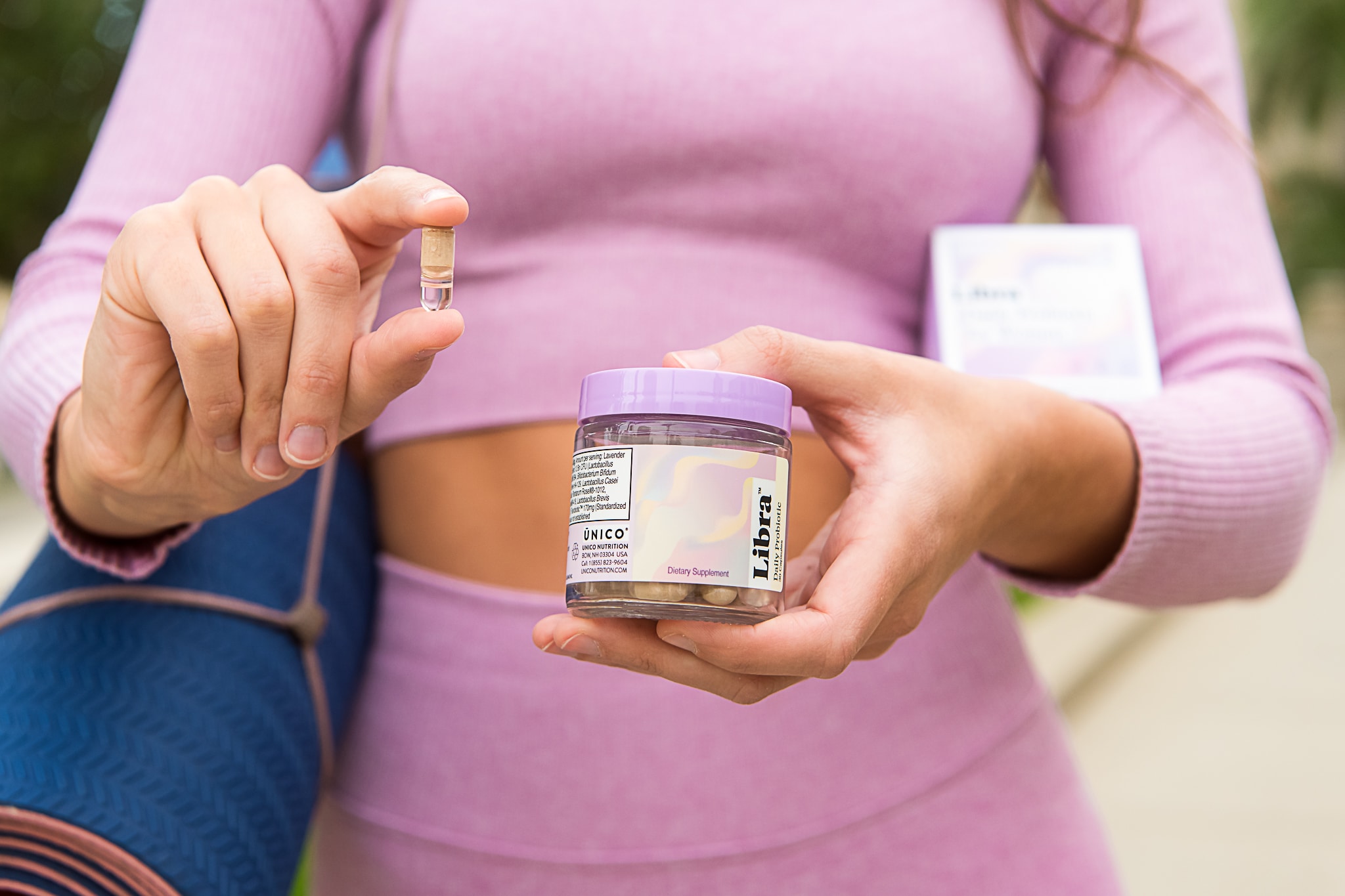We’ve all been there – you waited too long to eat, and then proceeded to scarf down dinner. Now you’re dealing with some burping, indigestion, and a bloated tummy.
Dealing with bloated abs is actually a super common problem- but that doesn’t make it any more pleasant.
Having a bloated abdomen is uncomfortable and may interfere with your ability to work, play, or attend social gatherings.
It can also take a toll on your self-esteem!
Luckily, there are a few different ways to address bloated abs, so that you can get back to you normal, non-bloated self.
In order to alleviate the symptoms of bloated abs, you should know what’s causing them in the first place.

What is Bloating?
Abdominal bloating happens when your gastrointestinal (GI) tract fills up with too much air or gas.
A lot of people describe bloating as feeling “overly full, swollen, or heavy and tight in the abdomen.”
When you’re bloated, your stomach may be puffy, hard, and painful. You may have abdominal pain, gas, burping, and stomach gurgling.1
Remember: There is a difference between not having visible abs because of bloating and not seeing your abs because of higher body fat percentage or underdeveloped abdominal muscles. We’ll get into that more later.
What’s Causing Your Bloated Abs?
While there can be many causes of the dreaded bloated abs, there are a few things in general that may be the culprit.
Here are the three most common causes of bloated abs:
1. Excess Gas and Air
Gas is the most common cause of bloating, especially after eating or drinking.
When your food is being digested, gas builds up in the GI tract.
This also happens when you swallow air.
Everyone swallows air when they eat and drink, but some people may swallow more air if they eat or drink too fast.
Another possible reason for excess gas and air during digestion is poor gut health.
An imbalance in the healthy gut bacteria can cause your stomach to become upset during the digestive process.
Burping and passing gas are how the body gets rid of excess gas to relieve bloating.
While this may happen every now and then in most people, if it happens regularly, you may have a digestive problem and should consult a physician or dietitian.
2. Food Sensitivity or Intolerance
Some foods may cause excess gas and bloating in some individuals due to sensitivity or intolerance.
The most common food sensitivities and intolerances are:
- Dairy
- Gluten
- Shellfish
- FODMAPs (fermentable oligosaccharides, disaccharides, monosaccharides, and polyols), but there are others.
Some people may also have sensitivity to beans, onions, and cruciferous vegetables.
Tip: Keeping a journal or log of your symptoms and what you eat can help you track any foods that might be triggering your bloating.
You can also try an elimination diet to figure out if certain foods may be causing your frequent abdominal bloating. A registered dietitian can guide you through this process.
3. Medical Concerns
There are several medical conditions that can cause bloating, so if you’re experiencing bloating more often than not, you should seek help from a medical professional. Some medical problems that are accompanied by bloating include:
- Irritable bowel syndrome (IBS)2
- Inflammatory bowel disease, such as Crohn’s or ulcerative colitis3
- Celiac disease or gluten intolerance
- GERD
- Hormone imbalances, especially in women4
- Eating disorders
- Mental health concerns, such as anxiety and depression
IMPORTANT: If you are experiencing bloating on a regular basis and it interferes with your day to day life, consult a doctor to rule out any serious medical conditions that may be causing it.
Ways to Prevent or Relieve Bloated Abs
If your bloating isn’t caused by an underlying medical condition, there are some lifestyle changes you can try to reduce or alleviate your symptoms.
Exercise
Physical activity can help reduce the symptoms of gas and bloating.
If you’re not already, participating in a regular exercise routine can improve your bloating.
It can be as simple as taking a walk every day!
Consistent exercise can also help with weight management, which may also improve the visibility of your abs.
There are certain exercises you can do to develop your ab muscles and make them more defined.
Pelvic floor exercises (such as kegels), planks, and dead bugs are safe and effective exercises to build the strength of your inner core.
Pilates is also a great workout to strengthen those deep abdominal muscles and the pelvic floor.
If you want to visibly build the muscles that make up the 6-pack and obliques, exercises like sit ups, crunches, and russian twists will help you create the definition you are seeking.
In order to have visible abs, you’ll need to achieve a relatively low body fat percentage.
The reality is that most people aren’t lean enough to see their abs, and it’s not often necessarily healthy to be that lean, especially for women.
However, if you are set on this goal, this is when nutrition comes into play.
Nutrition
As mentioned before, there is a difference between not having visible abs due to bloating and not seeing your abs due to higher body fat percentage and lack of developed muscle. Nutrition can play a role in both.
Excess body fat around the midsection can hide the abdominal muscles, so if you want to see the results of the ab exercises you’ve been sweating over, you’ll need to support your workouts with the right nutrition.
When someone works on strengthening their core and abs but continues to eat poorly, this can actually lead to an abdomen that appears larger because they’re actually building up the muscle under an already large area.
Instead of doing ab exercises excessively, the focus should be on eating a balanced diet to fuel your exercise routine.
Incorporate a variety of foods from all food groups including fruits, healthy vegetables, whole grains, legumes, lean proteins (poultry, eggs, fish), and nuts and seeds.
A high-quality protein powder can also help you lose weight by keeping you full, and building lean muscle (which burn fat to derive energy!).
Now. Recall what I mentioned earlier about air being one of the causes of bloating…
If you are prone to abdominal bloating, eating slowly can help reduce the amount of air you swallow, which may reduce gas and bloating.
Identifying the foods that are causing your symptoms is important to getting rid of the problem.
Common foods that can cause bloating include:
- Dairy
- Carbonated beverages
- Artificial sweeteners
- Cruciferous vegetables
- Beans
You can try eliminating foods you think may be causing your bloating to see if that helps. If you’re not sure where to start, consult a registered dietitian.
Supplements
Poor gut health may cause an upset in digestion and cause symptoms of bloating and gas. When there are not enough good bacteria in the gut, or an overgrowth of bad bacteria occurs, the gut microbiome becomes unbalanced.
A diet that includes probiotics and prebiotics can improve gut health and get rid of bloating. Probiotics contain healthy bacteria that support gut health. Foods that contain probiotics include yogurt and kefir, sauerkraut and kimchi, tempeh, and miso. If you don’t get a lot of these foods in your diet, you can also take a probiotic supplement.
Prebiotics act as food for the healthy bacteria that live in the gut. Prebiotic foods include garlic, onions, asparagus, bananas, oats, and apples, just to name a few.
Adding probiotics and prebiotics to your diet may help reduce or eliminate bloating.
Tip: Keep in mind that the time of day that you take probiotics can impact their effectiveness!
Conclusion
Bloated abs can be painful, uncomfortable, and interfere with your day to day life.
It’s important to determine the cause of your abdominal bloating before you can treat the problem.
Excess gas and air, food sensitivities and intolerances, or medical concerns may be the cause of belly bloat.
Depending on which one it is, there are different things you can try to get rid of your bloated abs.
If you’re suffering from bloating on a regular basis, you should consult a doctor to make sure there’s nothing more serious at play.
Once you’ve ruled out any medical conditions, experiment with your diet and exercise using the suggestions in this post to see what works for you.
Sources:
1https://www.ncbi.nlm.nih.gov/pmc/articles/PMC3816178/
2https://pubmed.ncbi.nlm.nih.gov/30565010/
3https://www.ncbi.nlm.nih.gov/pmc/articles/PMC5393974/
4https://www.ncbi.nlm.nih.gov/pmc/articles/PMC6865762/
5https://pubmed.ncbi.nlm.nih.gov/17029608/
6https://www.ncbi.nlm.nih.gov/pmc/articles/PMC6039952/
Recommended Reading:
- The Best Liquids to Mix Your Protein Powder Into - January 31, 2023
- What is a Caloric Surplus? Plus, Why Your Diet Isn’t Working.. - October 17, 2022
- How Much Protein Do I Need Per Day? A Dietitian’s POV - July 26, 2022

